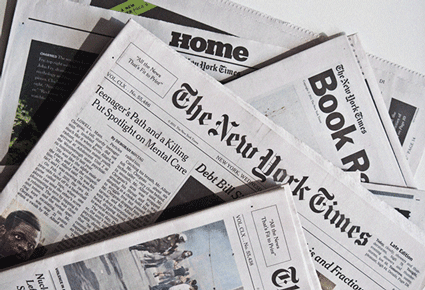After accidentally unplugging, chief strategy officer Brad Berens discovered the disadvantages of staying too current on the news and had a daydream about The New York Times.
_______________________________________________________________________________________
By Brad Berens
I missed the mid-terms last week. It was great.
Don’t get me wrong: I voted early by mail, so I did my civic duty. It’s what happened after I dropped my ballot that’s interesting.
 Due to travel in the wilderness and no access to the internet or other media, on Tuesday, November 6, I didn’t watch a moment of The Situation Room on CNN (sorry, Wolf Blitzer) or listen to a minute of NPR’s election coverage. I didn’t get notifications on my smartphone or see a single email.
Due to travel in the wilderness and no access to the internet or other media, on Tuesday, November 6, I didn’t watch a moment of The Situation Room on CNN (sorry, Wolf Blitzer) or listen to a minute of NPR’s election coverage. I didn’t get notifications on my smartphone or see a single email.
The nonstop news cycle — frenetic at the best of times and truly nutzo during elections — passed me by. It wasn’t until after 9:00pm on Wednesday, November 7, that I had a chance to look at the headlines on my phone. By that point the media had moved onto the president firing the attorney general. The election was yesterday’s news, literally.
I sunk back into the headlines with mixed emotions. On one hand, a lot had been going on so I leaned in with intensity because part of my job and my character is to keep up. On the other hand, dread churned in my stomach as I felt my mind crackle and my attention flit across different publications, posts, emails and notifications.
I only had moments to skim the deets on the election before my wife and I got back into our rental car for another hour of travel. As we drove through the night, my stomach and mind calmed. I realized that by skipping the froth of live election coverage I had missed nothing of significance. There was no action that I could have taken that would have affected the results. There was nothing being shared in the media that would change my immediate situation last Tuesday and Wednesday.
If journalism is the rough draft of history, then breaking news stories are the scribbled notes that come before the rough draft: they might be of some vague historical interest, but generally they aren’t worth keeping, and the story will have matured by the end.
I am not arguing that the news is unimportant. I subscribe to three newspapers, numberless magazines and newsletters, and my most-listened-to radio station is NPR. Nor am I arguing that there is never a moment when breaking news is actionable: the wildfires raging through California right now, for example, are urgently important for anybody living nearby.
What I am arguing is that breaking news today serves the business interests of news organizations rather than the interests of their audiences. This wasn’t always the case.
There are no extra editions online
Before radio, television and the internet, newspapers could release extra editions to cover stories too urgent to wait for the next regular edition. That’s where the cliché of nineteenth and early twentieth century newsboys and newsgirls crying, “Extra! Extra! Read all about it!” comes from. However, certain business realities inhibited newspaper editors and publishers from putting out extra editions casually. Doing so required reporters to write copy, typesetters to create a new edition, printing presses to roll, and transporters to carry the extra edition to newsstands and kids carrying satchels full of papers.
All these things cost money. Editors and publishers had to balance their desire to inform the public against their need to sell papers: enough people had to buy the extra edition and there had to be enough advertising to warrant an extra.
That is not the case today, where distribution to televisions, computers, tablets and phones is immediate and frictionless. Instead of having to decide if a story is important enough to roll the presses for an extra edition, today’s editors and publishers have the opposite problem: they have to create enough content to feed a never-ending news cycle machine, with an inevitable attendant lowering of standards.
_________________________________________________________________________________________________
I only had moments to skim the deets on the election before my wife and I got back into our rental car for another hour of travel. As we drove through the night, my stomach and mind calmed. I realized that by skipping the froth of live election coverage I had missed nothing of significance. There was no action that I could have taken that would have affected the results. There was nothing being shared in the media that would change my immediate situation last Tuesday and Wednesday.
_________________________________________________________________________________________________
Significantly, this also transfers the burden of deciding what is an important news story to us—the readers, listeners and viewers. None of us signed up for this job. And, since we are a novelty-seeking species, we are all spectacularly ill-equipped to do this job in the first place.
It’s like electing to receive in a game of darts.
A New York Times daydream
Last Thursday, as I landed in Los Angeles for my next leg of travel and had screens aplenty blurting the news from every angle, I had a daydream.
Since 1897, the tagline of The New York Times has been “All the News That’s Fit to Print,” although that tagline understandably doesn’t appear in the online version. My daydream was that The Gray Lady would create a slender, new, print-only edition that would come out after lunch. None of the stories in that edition would be available online until the following morning. You’d have either to subscribe to have it delivered or venture away from your home, office, school, or coffee shop to buy a physical copy that would be aggressively priced somewhere north of the morning edition’s $3.00.
For readers, with a printed edition, there would be no hyperlinks to other down-the-rabbit-hole stories and no time-wasting videos. Advertisers would pay a premium to have reader attention not subject to ad-blockers.
The morning edition of any major newspaper covers what happened yesterday. The online edition covers what’s happening right now. The messy middle is what an after-lunch edition would cover, answering the question, “what do I need to know about today?” This would give us all the chance to turn off the clocks, give the dog a juicy bone, smother the smartphone, unplug the router, and get a sense of what’s happening out there before turning back to the things that really matter.
In 1890, the great psychologist and philosopher William James wrote, “My experience is what I agree to attend to. Only those items which I notice shape my mind—without selective interest, experience is an utter chaos. Interest alone gives accent and emphasis, light and shade, background and foreground—intelligible perspective, in a word.”
It’s nearly impossible to get intelligible perspective in a 24/7 news cycle. Sometimes the best option is to opt out.
__________

Brad Berens is the Center’s Chief Strategy Officer.
See all columns from the Center.
November 14, 2018

